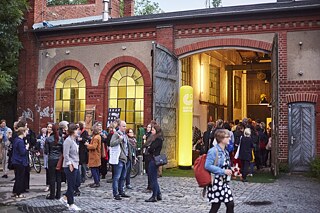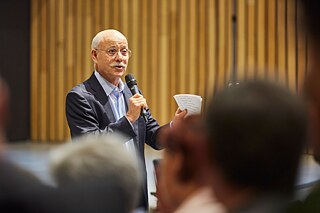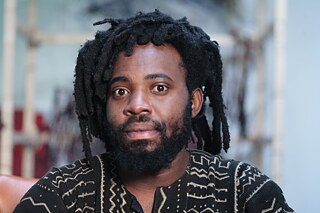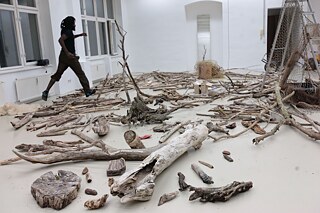Foto: Jörg Gläscher
2011
Tarabya Cultural Academy opens in Istanbul
Space for new perspectives
In 2011, the Cultural Academy Tarabya opens in the German ambassador’s picturesque, historical summer residence in Turkish Istanbul. The center offers grants to people engaged in the cultural sector from Germany and Turkey to come and engage in artistic-cultural exchange.
More than 100 grant recipients who live and work in Germany have already had the opportunity to devote themselves completely to their artistic endeavours in the German ambassador’s historical summer residence. Recipients include Ulla Lenze, Max Czollek, Kübra Gümüşay and David Wagner. Since 2021, German-Turkish artist pairs have also been eligible for residency grants with support from the Allianz Cultural Foundation. It is not only on the Bosporus that the Goethe-Institut runs a residency programme. In Kyoto, the Villa Kamogawa has been offering artists and academics from Germany a chance to work for three months in a new place, exchange ideas with the local cultural scene, and pursue their craft free from financial strain. In 2016, the Vila Sul was also founded in Salvador de Bahia.
Foto: Jörg Gläscher
2016
Digital Kinderuniversity (“Kinderuni”) starts in Moscow
Why can you hear the sea in a shell?
Learn more
2016
Digital Kinderuniversity (“Kinderuni”) starts in Moscow
Why can you hear the sea in a shell?
How do you teach children German while also imparting interesting factual knowledge? The Kinderuniversity initiated by the Goethe-Institut Moscow does just that: The playful learning platform with courses in a “Sendung mit der Maus” style is available in 32 languages today.
Children are naturally inquisitive and learn even faster when content is presented in an appealing way. The Kinderuniversity offers insights into various fields of knowledge in the style of the popular German children’s show “Sendung mit der Maus” with its “funny and factual stories”. It creatively combines these little fact vignettes with German language acquisition. The educational project is aimed at children aged eight to twelve. Originally launched in Moscow in 2016, the Kinderuniversity is now available in 32 languages and was particularly popular during the coronavirus lockdown.
Foto: Jörg Gläscher
2016
First Kultursymposium Weimar
The global networking festival
What moves the world? How do we shape the future? The Kultursymposium Weimar brings together experts from fields like science, media, art and politics to illuminate a topic from a range of perspectives in lectures, discussions and art performances. The Goethe-Institut organises the symposium to bring international discourse and voices to Germany. In 2016, the KSWE is dedicated to “The Sharing Game”; in 2021, the third symposium will explore “Generations”.
-

The first Kultursymposium is held from June 1 to 3, 2016 on “The Sharing Game – Exchange in Culture and Society”. Photo: Jörg Gläscher. -

Israeli sociologist Eva Illouz (left), German ethnologist Hans Peter Hahn (right) and Czech economist Tomáš Sedláček converse during the opening discussion. Photo: Cordula Flegel -

The audience enthusiastically continues the conversation between events. Photo: Jörg Gläscher -

In his key lecture, US economist Jeremy Rifkin talks about “the Role of Sharing in the Third Industrial Revolution”. Photo: Jörg Gläscher -

Composer Sven Helbig and the German National Theatre Weimar’s ensemble and opera choir. Photo: Jörg Gläscher -

The theme of the second Kultursymposium in 2019 is “Recalculating the Route”. Photo: Jörg Gläscher -

Artist Carlos Celdran, media expert Anna Szilágyi and Vice President of the German Bundestag Claudia Roth talk to moderator Thilo Jung (from left to right) about “The Brutalization of Language in Political Discourse”. Photo: Bernhard Ludewig -

Taiwanese choreographer and inventor Huang Yi dances with industrial robot KUKA and dancers Hu Chien and Lin Jou-Wen. Photo: Jörg Gläscher -

The third symposium on “Generations” will take place in the digital realm in 2021. This picture is from the “Old Wishes” multimedia project by Sudanese artist Abdalsalam Alhaj. Photo: © Abdalsalam Alhaj 2021
© Goethe-Institut / Katja Volkenant
Photo: Kinga Kielzynska
2018
Establishing the Henrike Grohs Art Award
A prize for young African artists
In memory of Henrike Grohs, who was killed in a 2016 terrorist attack, the Goethe-Institut and Grohs’ family honour young African artists and collectives. An ethnologist, Grohs headed the Goethe-Institut in Abidjan, Côte d’Ivoire. The prize is aimed at artists in the visual arts who are just starting their careers.
-

Em’kal Eyongakpa is the first prize winner in 2018. His art explores indigenous knowledge systems, ethno-botany, applied mycology and technology. Photo: Studio Eyongakpa -

The Cameroonian artist is honoured for his “Sound grown batch #5 blue oysters at studio Efforbi II” installation. Photo: Studio Eyongakpa -

Kenyan Jackie Karuti is named the 2020 Henrike Grohs Art Award recipient. She combines drawings, videos, installations and performance art in her pieces. Photo: Tõnis Saadoja -

The jury notes that “Karuti’s work carries a unique poetic dimension; her interests lie in the corresponding exploration of technologies and points of view.” Photo: James Muriuki
Photo: Kinga Kielzynska

2019
Year of German-American Friendship
Hiphop, Bauhaus, Tech and Techno
October 2018 marks the start of the “Year of German-American Friendship” when the US and Germany celebrate their transatlantic friendship under the “Wunderbar Together” motto. Around two million people take part in the 2,800 events sponsored by the German Foreign Office, organized by the Goethe-Institut and supported by the Federation of German Industries.
© Keren Kuenberg
© Keren Kuenberg

2020
Germany`s EU Council Presidency
EU 2020: The Goethe-Institut for Europe
© Photo Michael Friedel

